UNDERGRADUATE RESEARCH BLOGS
The Office of Undergraduate Research sponsors a number of grant programs, including the Circumnavigator Club Foundation’s Around-the-World Study Grant and the Undergraduate Research Grant. Some of the students on these grants end up traveling and having a variety of amazing experiences. We wanted to give some of them the opportunity to share these experiences with the broader public. It is our hope that this opportunity to blog will deepen the experiences for these students by giving them a forum for reflection; we also hope these blogs can help open the eyes of others to those reflections/experiences as well. Through these blogs, perhaps we all can enjoy the ride as much as they will.
EXPLORE THE BLOGS
- Linguistic Sketchbook
- Birth Control Bans to Contraceptive Care
- A Global Song: Chris LaMountain’s Circumnavigator’s Blog
- Alex Robins’ 2006 Circumnavigator’s Blog
- American Sexual Assault in a Global Context
- Beyond Pro-GMO and Anti-GMO
- Chris Ahern’s 2007 Circumnavigator’s Blog
- Digital Citizen
- From Local Farms to Urban Tables
- Harris Sockel’s Circumnavigator’s Blog 2008
- Kimani Isaac: Adventures Abroad and At Home
- Sarah Rose Graber’s 2004 Circumnavigator’s Blog
- The El Sistema Expedition
- The World is a Book: A Page in Rwand
Test Post
Leaving 2 days – so excited!
Elizabeth’s Circumnavigator’s Blog!
It has now been a few months since I received that life-changing phone call. I remember the moment vividly: walking out of Tech on a rainy day, clutching my phone against my ear. The words that I heard made me let out an involuntary yell of joy — I had won the Circumnavigator Grant!
Since then, I have been immersed in research preparation and planning. But as the departure date approaches, I find myself questioning if I have fully processed the trip that awaits me this summer. For as long as I can recall, I’ve yearned to explore the world. I used to imagine myself wandering through scenic streets, tasting local cuisine, and traveling as if I were a character in a movie. And now, that dream is becoming a reality! It’s surreal and so exciting and just a little bit nerve-racking.
But above all, I am really grateful for this opportunity. I hope that my travels are full of deep learning, reflection, and restoration. I can’t wait to embark on this solo-adventure abroad!
Elizabeth
Elizabeth Dudley
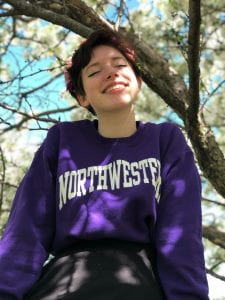
Please provide a brief summary of your research.
My research looked at how factors beyond an individual school/teacher (such as recessions, state education budgets, and the time of year) affected success rates and fundraising outcomes in crowdfunding for public schools. Another significant part of my research was looking at equity in outcomes by community prosperity at the school and state levels. The final findings of my research provided some interesting understandings of how equity in crowdfunding is more complicated than it seems. Success rates correlate with e, and projects’ success rates varied significantly by the type of materials requested and the proportion of high-poverty students; but schools with higher levels of poverty were less negatively affected by recessions.
What made you initially interested in researching your project in particular?
After completing a comprehensive literature review of crowdfunding with Dr. Gerber through URAP, I wanted to dig in deeper to one particular niche. Education crowdfunding was particularly interesting because I’d seen a lot behind the scenes of school fundraising through my mom’s work, so it was neat to explore a different format of funding schools.
What made you interested in pursuing (interdisciplinary) research more broadly?
Research interests me because you get to spend so much time with a particular topic of interest – on the quarter system, it feels like you’ll only get to spend a week or two on a class topic you care about before it breezes by!
Describe your experiences with research thus far. Was it tricky? What skills do you think you’ve gained?
The hardest thing about research so far has been finding my initial footing – I got rejected from a few programs before I started with Dr. Gerber through URAP. It was difficult to not compare myself to friends who had smoother paths into research, but no two research journeys are truly comparable. Learning to understand that we’re on similar, but not the same, paths is a really important skill I constantly develop. You’ll always get to where you’re meant to be in the way that’s right for you, even if it’s not as fast as it feels like you want it to be!
Any tips or advice you have for students similar to you that are interested in pursuing undergraduate research?
Be persistent in every way! Email professors you’re interested in working with and keep emailing until you can connect & don’t let one ‘no’ discourage you. I know it’s a lot easier said than done, but getting back up once you’ve let the disappointment process is another step closer to your goal. Above everything else, persistence is what’s gotten me through every research issue from finding a mentor to software problems.
What is your most useless talent?
I’m ambidextrous, but only for doing winged eyeliner!
Palak
Palak Shah
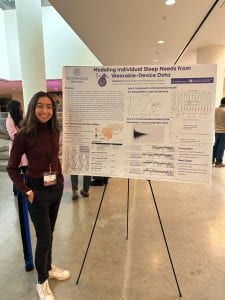
Please provide the tile and a brief summary of your research/conference presentation.
Title: Modeling Individual Sleep Needs from Wearable-Device Data An individual’s natural sleep and wake cycle plays a critical role in nearly every aspect of their daily life. There are currently thought to be two processes that interact to regulate one’s sleep/wake cycle: a sleep homeostat, which depends on the amount of time you have been awake; and the circadian rhythm, an internal 24-hour molecular clock present in nearly every cell of the body. Both processes differ between individuals, whether that’s from a decision to pull an all-nighter one day or from a genetic inclination towards being an “early bird” or a “night owl”. This project focuses on building a model that can predict how particular sleep disruptions impact an individual’s sleep cycle, as well as their ability to recover from these disruptions. These processes have been studied and modeled using mathematical equations, which I was able to rewrite as more biologically realistic equations, and implement as code, resulting in a computational “two-process” model that can simulate a theoretical sleep-wake cycle with disruptions. Once we have a model that can use an individual’s data to predict their optimal sleep despite disruptions, it could be used in the field of sleep medicine to identify and address parameters affecting those with sleep disorders. Given its versatility, the model could also be used by anyone experiencing disruptions due to travel, social events, work, or family, and provide information about how to get sufficient sleep regardless.
What made you initially interested in researching your project in particular?
I actually took a course called Modeling Biological Dynamics with Prof. Rosemary Braun, who is my mentor for this research project, and in that class, we learned mathematical and computational techniques for analyzing and predicting biological dynamics. So much of biology is made up of these dynamic systems, and it is incredible to see how we can model those computationally! It was eye-opening to be able to implement equations into code and see a system “come to life” as I generated the plots on my computer, and further, to be able to change parts of those equations and see how it impacts our system. The course was incredible & solidified my already intense passion for computational biology 🙂 Prof. Braun played a huge role in that, because in lecture she would be just as excited about whatever we were going to cover that day and she went above and beyond in explaining how and why these dynamic models are made and what makes them work. She happened to be starting a new project on modeling individual sleep cycles after our course ended, and reached out to see if any students would like to join – which became the opportunity of a lifetime for me!
What conference(s) did you present at and how did you find out about them?
National Collegiate Research Conference – I found out by doing a Google search for upcoming undergraduate research conferences because I hadn’t gotten the chance to present my research yet and was itching to do so!
What was it like presenting at a conference? Anything that you didn’t expect?
I really enjoyed it 🙂 I didn’t realize how awesome it would be to talk to other people about my research and get them just as excited as I am about the project. Since this was an undergraduate research conference, instead of focused on a specific subject area, I was also just blown away by the breadth of research projects that students around the world are working on. It was incredible to meet and learn from my peers in such an intellectually stimulating environment at Harvard University.
Any tips or advice you have for students similar to you that are interested in presenting at a conference one day?
I would definitely recommend starting off with an undergraduate conference – a great option being the OUR’s Annual Research Expo in the Spring – because it’s honestly a lot less nerve-wracking for your first-time presentation to be to mostly undergraduate students who can relate to your current experience. That being said, presenting your work is really just a valuable experience that lets you discover more about your own project, and allows you to connect with other researchers like yourself, who are all working towards this common goal of bringing new information into the world.
If you had unlimited time, money, resources, support, etc. what is something you would research?
I’ve always been curious about the presence of so many squirrels on every college campus I’ve seen – so I’d want to find out if there is a significant correlation and if so, why? Who knows, maybe squirrels are all insanely smart and they just come to listen in on our classes and stuff?
What is your most useless talent?
I can make any animal sound … a little too spot-on
Lucy
Lucy London
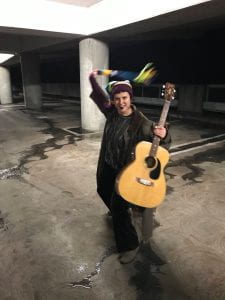
Please provide a brief summary of your research.
For my project I performed on various street corners around the country, from Chicago to San Francisco, Seattle to Juneau, Alaska, to research how music and performance reflects and changes the mood of a space, and how it has the power to draw passersby into an emotional headspace and create deep connections in an ever-estranged world.
What made you initially interested in researching your project in particular?
I like to sing with my guitar on the street and I felt there was a lot to unpack about the experiences I had doing that.
What made you interested in pursuing (interdisciplinary) research more broadly?
I wanted to focus my attention on something meaningful to me and try to parse our what made it meaningful and useful for the world.
Describe your experiences with research thus far. Was it tricky? What skills do you think you’ve gained?
Although I had a lot of fun doing my research, it was oftentimes also scary to get in front of a crowd of un expecting passersby to sing a song. It put me on the journey of learning how to let go of my filter of whether something is socially acceptable and just allowing whatever happens to transpire. Usually it heeds exciting results.
Any tips or advice you have for students similar to you that are interested in pursuing undergraduate research?
What makes you come alive? Follow that! Go for it!
If you had unlimited time, money, resources, support, etc. what is something you would research?
Why humans are never satisfied
What is your go-to phrase to yell during the finals “Primal Scream”?
Aaaaaaaaaaaaaah (with a yodel)
Favorite bathroom on campus?
Parkes Hall secret bathroom on the first floor
What’s the most interesting thing you’ve learned/read about/listened to this week?
In the scope of eternity, everything is just as it should be, and that since time isn’t real, everything is perfect and all is well.
What is your most useless talent?
I can sing opera while walking on my hands (but I think it’s pretty useful).
Roy
Roy Zhu
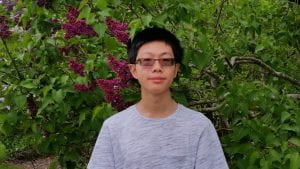
Please briefly summarize your research.
I’m really interested in community archives and participatory storytelling/archival work that takes place in queer communities! Last summer, I worked with Professor Rodriguez at the Puerto Rican Cultural Center in Humboldt Park, Chicago, where a community archive project is underway to collect materials from multiple eras of political activism, resistance, and community formation in the Puerto Rican neighborhood known as Paseo Boricua. This summer, I’m working on creating an oral history and multimedia archive of the experiences of queer Asian Americans in the Boston area, where I am originally from. I will be interviewing queer Asian people from different walks of life, focusing specifically on feelings of isolation, community, and political/social involvement. I am also hoping to collect some materials and media that will serve as an archive of queer objects. The aim of my research is to promote the sharing of queer wisdom and sites of belonging.
What made you interested in pursuing (interdisciplinary) research more broadly?
I have always found it hard to restrict my interests into one category! And I think it’s cool that we’re becoming more used to seeing people combine different sources of knowledge and deconstructing what is a “hard science” or “humanity” or whatever. I’ve been inspired by a lot of knowledge-synthesizing fields like queer ecology or Black geography, which are reshaping how we think about the laws that govern our bodies and relations.
How has it been working with faculty to transition from an assistant position to a more independent role?
My faculty advisor was really determined to help me succeed at my own project and so my transition from assistant to independent role was very smooth. I was able to use a lot of skills and foundational knowledge that I gained from working for the PRCC archive to think about what roles a community archive might play in a queer and Asian space. Working closely with Prof. Rodriguez has helped me navigate building my own project without feeling overwhelmed.
What’s been your favorite part about being in a cohort with other scholars?
I love the community that we have and I love how passionate and empathetic everyone in my cohort is. It makes me feel much more confident in myself and reassures me that my research is valuable!
Do you have any tips or advice for first years similar to you who are interested (but maybe hesitant) to apply for a 15 month long program?
There is flexibility! A lot of stuff can happen/change in 15 months and that’s okay! You can still do the program. And you don’t need to confine yourself to the same research that your professor/mentor is doing! Also, finding a place to stay over the summer and taking care of yourself can be intimidating, but Chicago is an amazing place to be and there are a lot of fully furnished apartments you can sublet around campus!
Favorite bathroom on campus?
Willard – double shower curtains!
What is your most useless talent?
Keeping a long Duolingo streak
Joy
Joy Fu
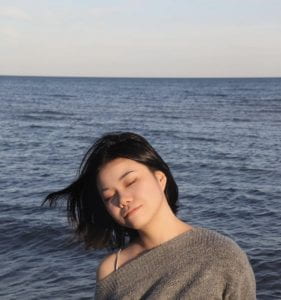
Please provide a brief summary of your research.
Past research in syntax has shown that a phenomenon called “grammatical illusion” exists in English. “Grammatical illusion” happens when native speakers of a language erroneously accept ungrammatical sentences. For example, in “The key to the boxes are on the table” (Bock & Miller, 1991), the plural noun, boxes, makes readers erroneously accept this sentence. More specifially, researchers have found grammatical illusions in English “locative constructions,” which refer to sentences like “Mary put chocolates in a container” or “I poured water into the cup” (Kim & Yoshida, 2016). So far, there has been no related research in Mandarin Chinese. In my research, I aim to answer the following questions though studying Chinese locative constructions: Do grammatical illusions exist in Mandarin, or is the phenomenon only observed in English? If it does, in which environments are such illusions most prevalent?
What made you initially interested in researching your project in particular?
Before Winter 2022, I had never thought that I would pursue research in syntax. Although I was already a Linguistics major interested in human language at the time, the connection between language and social factors (sociolinguistics) excited me the most. In Winter 2022, I took Prof. Masaya Yoshida’s class on syntax. Hoping to understand the relationship between syntax and sociolinguistics, I went to Masaya’s office hours. Little did I know, our discussions opened a new world for me: As a bilingual speaker, how does my Chinese syntax affect my English? How can Chinese and English syntax be similar in unexpected ways? These questions motivated my research questions for this project and drives me to fill the gap in the field of Chinese syntax research.
What made you interested in pursuing (interdisciplinary) research more broadly?
Research has always been a way to fulfill my curiosity, intellectual or not. It also enables me to explore different facets of my identity in a systematic way. For example, I enjoy watching New Wave films, and I’m also interested in diverse Chinese dialects. Last year, I was able to combine these two interests of mine in my research project “The Use of Languages in Taiwan New Cinema.” I was able to watch as many Taiwanese films as I wanted and learn more about how history affected language manifested in the films. Research allows me to dive deeply into my passions, and that’s why research has also become one of my passions.
Describe your experiences with research thus far. Was it tricky? What skills do you think you’ve gained?
Research is definitely not a linear process. The most important skill I’ve gained through research is the ability to adapt to new challenges that might come up. For example, this summer, I found out that there was barely any literature related to Chinese locative verbs, so I went ahead and constructed thousands of sentences on my own. In the data collection process, because there are less Mandarin native speakers in the U.S., recruiting participants was very tricky. I learned that patience is key, and that it’s always important to trust the process.
Any tips or advice you have for students similar to you that are interested in pursuing undergraduate research?
Talk to your professors and go to office hours! You never know if you’ll find out about a topic that interests you.
What is your most useless talent?
I can taste how fresh a cooked shrimp is (how long it has died)
Rama
Rama Darayyad
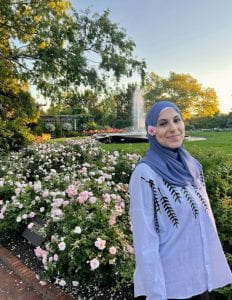
What language did you study and why?
American Sign Language (ASL) – I chose to specifically study ASL because proficiency in this language is essential to my ultimate goal of becoming a hearing healthcare professional qualified to visit underserved countries to serve Deaf refugees and individuals with hearing loss around the world. Not to mention — ASL is a really cool and unique language!
What program did you attend and why did you choose it?
I had the opportunity to study ASL in an 8-week intensive course at the University of Chicago’s Summer Language Institute, providing me with a year’s worth of ASL instruction. I specifically chose it as my language program primarily because it is only one of two programs I have found that satisfy the requirements of the ULG grant for American Sign Language, as agreed upon by an advisor: the 220 hours of instruction, in which I studied ASL for five hours a day, five days a week for two months, proved to be the longest and most immersive, affordable course I could find available. Also, one of my favorite aspects was that the course was taught entirely by an individual who is Deaf, making the experience more authentic and rewarding.
Describe your experience doing summer language study. Was it tricky? How do you think your language skills improved?
It definitely wasn’t as easy as I thought it would be! It required constant review and repetition, but this ultimately helped improve my language proficiency. Also, since communication in ASL is based on visual signs mainly done through hands, facial expression, and body language, I had made this my reality even outside of class. Sometimes, when I speak with my family — even today, I still sign what I say to make sure I don’t forget my vocabulary. I ultimately realized that language is all about practice, if you don’t retain it through consistency and repetition, you will lose it just as easily as you learned it.
Did intensive summer language study change or solidify any of your future goals? If so, how?
It definitely solidified my future career goal of becoming a hearing healthcare professional qualified to serve individuals who may utilize ASL. Before my program, I was inspired by ASL, and now, I’ve immersed myself in it! I’ve learned more about deaf culture, language acquisition and experienced being part of an amazing community that I don’t want to let go of. When school gets overwhelmingly difficult, I think of my experience learning ASL over the summer and it motivates me to work harder towards the career goals I yearn to achieve in the future.
Do you have any tips or advice for students similar to you that are interested in pursing intensive language study?
Just go for it!! Even if you think it’ll be difficult because the language you want to study is not very well-known or there aren’t many programs for it, don’t let that stop you from trying. I hope my journey of being the first recipient to successfully be funded the ULG to study ASL can be of motivation and proof that is IS in fact possible.
What is your go-to phrase to yell during the finals “Primal Scream”?
I haven’t done it yet, but I plan on doing so this quarter though because it’s been my worse one yet haha!
Favorite bathroom on campus?
SHEPARD Hall!
Elizabeth H
Elizabeth Hyun
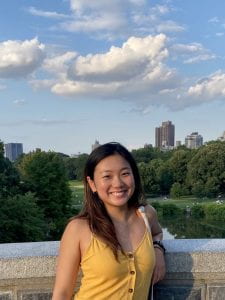
Please provide a brief summary of what you plan to research over the summer, where you plan to go, and why you chose those locations.
I plan on researching the factors that contribute to the prevalence of trauma diagnoses in Argentina, Northern Ireland, Bosnia and Herzegovina, Rwanda, and South Korea. I chose these locations primarily because they are post-conflict regions, so they have a large population of traumatized individuals and spaces for trauma care. I also selected these countries because they offer valuable insight into the diversity of trauma narratives and experiences around the world.
What made you interested in pursuing interdisciplinary research?
I became interested in pursuing interdisciplinary research because I personally found that my passions rarely fit into one specific discipline. At Northwestern, I have really enjoyed taking a wide variety of courses from multiple departments every quarter, and as a pre-med student, I have learned that effective and compassionate healthcare encompasses knowledge and skills from a diverse range of disciplines. So, I am excited to integrate social science research into my academic career!
Describe your experiences with research thus far in your career.
I currently work as an undergraduate research assistant in an oncology lab at Feinberg. I have learned many practical scientific skills from working in this lab, but I also had a passion to learn more about mental health topics via ethnographic methods. I conducted mini research projects in a few of my global health courses by studying transgenerational differences in experiences of depression among 1st generation and 2nd generation Korean immigrants. However, this is the first time that I am pursuing a qualitative research project of this size.
What made you initially interested in researching your topic in particular?
I became interested in researching trauma in particular because I believe that the world we live in today is deeply traumatic; I want to learn more about the experience of trauma and trauma care as it is a globally meaningful topic. I also became intrigued by the complexity of trauma as a psychological, social, and clinical phenomenon when I took a course on trauma last quarter.
Any tips or advice you have for students interested in pursuing undergraduate research?
I think that the biggest piece of advice that I have in pursuing undergraduate research is to trust your passions! There is a really great network of support at Northwestern from faculty and the Undergraduate Office of Research to help you reach your goals.
Which aspect of your trip are you most excited about?
One of the most enjoyable parts of traveling is the relationships and connections that I get to make with different people, so I am the most excited about all of the people that I am going to meet and learn from in the 5 countries that I will visit. I am also excited about all the different types of food that I will get to experience!
Do you collect anything?
I love to collect postcards from the places that I visit around the world. Sometimes I will put them up on my wall so that every time I look at them, I can remember the experiences that I had in my travels, and other times, I will use them to write cards to friends and family.
What is your favorite dessert?
My favorite dessert at the moment is a chocolate molten lava cake!
Andrew
Andrew Daniels
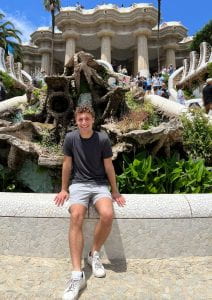
What language did you study and why?
Having built a strong foundation in my Spanish skills throughout high school, which sparked my desire to become fluent and eventually work in Spain, I knew that studying abroad in a Spanish-speaking country in college would be the best way accelerate my language learning. I have always sought out ways to gain a deeper meaning of global connections through Spanish language, and studying Spanish as part of Northwestern’s Spanish Language and Culture Summer 2022 Program in Barcelona was the ideal way for me to improve my Spanish while making memories that will last well beyond my college years.
What program did you attend and why did you choose it?
I attended NU’s Spanish Language and Culture Summer Program in Barcelona. This specific program caught my attention due to the specialized curriculum Northwestern and the Universitat Pompeu Fabra have constructed for Northwestern students. The program also made the most sense given my future aspiration to work in Spain after graduation. Not only did studying in Barcelona allow me to absorb Spanish culture and traditions, but it also enabled me to refine my Spanish accent and jargon specific to Spain and its various regions.
Describe your experience doing summer language study. Was it tricky? How do you think your language skills improved?
My summer language study experience was incredible. The ULG made it possible for me to take advantage of everything my program had to offer. Of course, language learning in another country inevitably leads to challenges in adjusting to a foreign way of life. That said, many of my favorite memories were the result of being put in new contexts and learning to embrace cultural and linguistic differences. While regularly speaking the target language with classmates, professors, and locals can be intimidating, I found that my language confidence improved immensely the more I leaned into the language and spoke it as often as I could. As a result of my experience, I can confidently say I am a better Spanish speaker and a more thoughtful global citizen.
Did intensive summer language study change or solidify any of your future goals? If so, how?
My summer experience certainly solidified my love of Spanish language and culture, improved my skills, and assured me that my professional path should take me to Spain. Upon returning to campus from my summer abroad, I have continued my Spanish studies in classes and am seeking out work experiences in Spain. In fact, I just applied to a Madrid-based internship for the upcoming summer — a position that I would not have felt qualified to apply for if I had not participated in the Barcelona program. Pursuing the language study experience has prepared me to work, live, and make an impact in a Spanish-speaking country.
Do you have any tips or advice for students similar to you that are interested in pursing intensive language study?
My biggest piece of advice for future students would be to find ways to authentically practice your language of study. There is no replacement for intensive language practice with native speakers, so take advantage of every opportunity in order to refine you skills. One of my favorite memories from my experience over the summer was making connections with local store owners. I would go to the market and bakery each morning and have great conversations with the locals who began to recognize me as a regular and would always speak Spanish with me. It was such an amazing way to authentically practice my language skills while meeting people I never would have met if it weren’t for the ULG and this experience.
